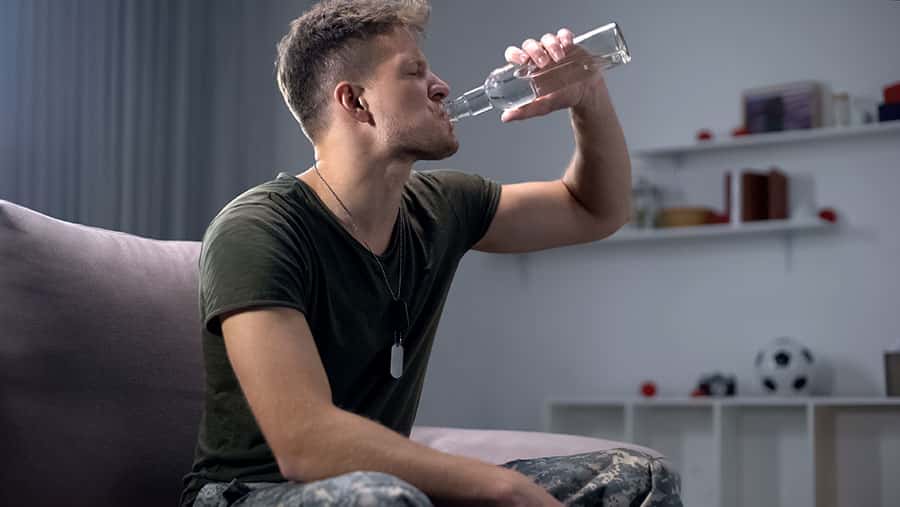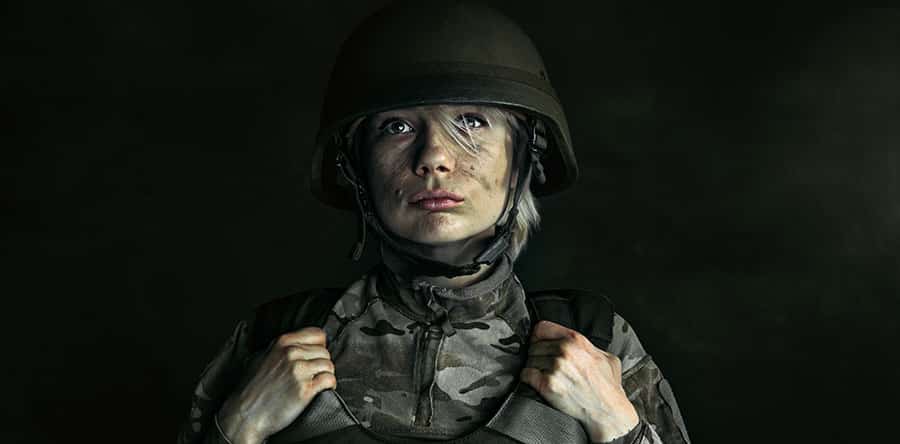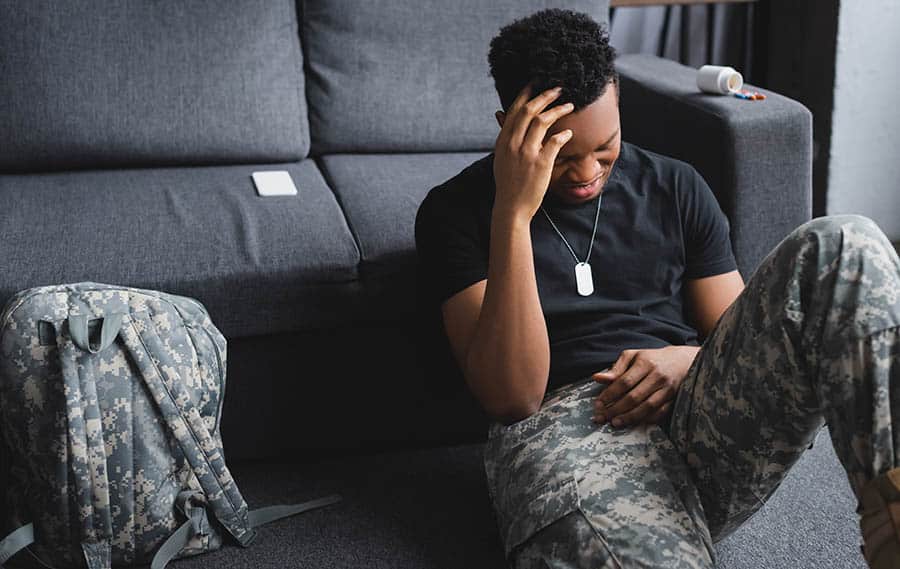PTSD, Veterans, and Addiction: What’s the Connection?
November is Veterans’ Month — and as November 2020 draws to a close, Hotel California by the Sea wants to celebrate the lives of our veterans, while also acknowledging the difficulties many present or past service members face when it comes to their mental health.
Veterans have unique mental health needs. Many vets have witnessed combat and horrific violence firsthand while protecting our country, leaving them vulnerable to drug addiction. These experiences can be incredibly traumatic, yet many veterans are afraid to reach out for help. They may not understand what is happening to them or that the symptoms they are experienced are connected to what they lived through as a member of the armed forces. Often, these people develop certain mental health conditions due to their trauma, like Post-Traumatic Stress Disorder (PTSD).
It’s estimated that 30% of Vietnam veterans and 20-30% of Afghanistan and Iraq veterans suffer from a mental health condition known as post-traumatic stress disorder (PTSD) during their lifetime. This mental disorder is also common in female veterans, as more than half of female military members experience sexual harassment, and more than one-fifth experience sexual assault.
The symptoms of PTSD can be frightening, confusing, and distressing, including nightmares and flashbacks that often feel real. In order to escape from these symptoms, many veterans turn to substances like drugs and alcohol to numb the pain. This blog post explores the relationship between PTSD, veterans, and addiction, and how veterans can find lasting freedom from their traumatic past.

What is PTSD?
PTSD occurs when the body’s natural response to trauma lasts much longer than the traumatic event. When we think of trauma, many people think of horrific events like war, natural disasters, or accidents, but what truly makes an event traumatic is our biological response to it. Any event can be traumatic if we experience it as traumatic.
Traumatic events activate our body’s fight-or-flight response, leading to a buildup of anxiety and adrenaline. This can lead to physical symptoms of PTSD, such as physical agitation, paranoia, numbness, and dissociation. Most people experience some degree of trauma response when they live through something traumatic, but the response fades over time as the event recedes into the past. However, in about 20% of people who live through a traumatic event, the response lasts much longer, developing into PTSD.

For people with PTSD, the traumatic event they witnessed or lived through might have been in the past, but it feels like it is still happening to them in the present moment. They continue to feel restless, agitated, paranoid, numb, or on edge, and experience intrusive memories (called “flashbacks”) and nightmares of the traumatic event.
Sometimes, flashbacks are triggered by reminders of the event in daily life, such as fireworks that sound like gunshots. Other times, they appear to come from out of nowhere. These flashbacks can become so all-consuming that they feel real. In veterans especially, this can lead to uncharacteristic outbursts of violence, as they may respond to the flashback as if they are still behind enemy lines.
PTSD is treatable with therapy and medication, but it can be challenging for veterans and their family members to cope with the diagnosis. Several studies with military populations from the last decade have also highlighted the negative effects that PTSD has on social relationships. Two studies in particular explore how PTSD often results in poorer relationships, and can even have a destructive effect on marital relationships and parenting. One of the reasons why PTSD is so difficult to recover from is the powerful effect of trauma on the brain. Studies have also shown that trauma results in lasting changes in parts of the brain such as the amygdala and hippocampus, which are responsible for mediating our fight-or-flight response, our memories, and more.
These biological and structural changes make it so that the body’s trauma response becomes its default setting. Over time, however, PTSD survivors can learn to “rewire” their brains to help them better cope with traumatic memories and stay grounded in the present moment, rather than remaining stuck in the past.
Sometimes, symptoms of PTSD are triggered by an injury to the brain, known as a traumatic brain injury (TBI). TBIs are similar to concussions and may be mild, moderate, or severe in nature. These injuries can result in impulsivity, outbursts of anger, anxiety, and other personality changes, similar to those seen in PTSD survivors.
The prevalence of TBIs in military populations may be one reason why so many veterans suffer from PTSD. By one estimate, as many as 22% of combat wounds are brain injuries. TBI symptoms often fade over time, but they appear to disappear more slowly in veterans than in other TBI patients. Most vets still have at least some symptoms within 18 to 24 months after the TBI.
Check Your Insurance Coverage for FREE
Find out if your insurance covers addiction treatment in minutes. We accept most insurance!
PTSD and Substance Abuse in Veterans
When you are suffering from PTSD, it can feel as if there is no escape from the intense flashbacks, horrific nightmares, and hyper-aroused state you exist in. As a result, many veterans with PTSD turn to alcohol or illicit drugs to drown out painful memories and numb uncomfortable emotions. By some estimates, as many as 60 to 80% of Vietnam veterans seeking treatment for PTSD also require treatment for substance abuse.

The problem with alcohol and drugs is that they are not a lasting solution for alleviating the symptoms of PTSD. At first, substances may appear to take the edge off, but over time, you may find that you require more and more of the substance to feel the same effects — known as building tolerance.
Eventually, using increased amounts of alcohol or drugs each day can result in a physical need for them, known as dependence. If you experience dependence on alcohol or drugs, you may go through symptoms of withdrawal when you stop using them, which makes it even more difficult to quit.
To make matters worse, people with PTSD have a harder time overcoming substance abuse than those without the disorder. The symptoms of PTSD, combined with the symptoms of alcohol or drug withdrawal, can result in unpleasant physical and emotional effects that may lead to a relapse.
Veterans with PTSD may also be more likely to be prescribed certain addictive drugs. For example, they may experience pain due to an injury sustained during the traumatic experience that requires the use of an opioid, or their doctor may give them addictive anti-anxiety drugs called benzodiazepines to alleviate the symptoms of PTSD.
Though the veteran may begin using these drugs with the best of intentions, they can quickly become addicted and start to need more and more of the substance to experience relief from their PTSD symptoms.
Veterans’ Mental Health Statistics:
- 30% of military personnel deployed in Iraq or Afghanistan have a mental health problem requiring treatment. (Mental Health First Aid)
- Approximately 300,000 Iraq and Afghanistan veterans have PTSD or major depression, and about 320,000 experienced a traumatic brain injury during deployment. (RAND)
- Fewer than half of returning veterans in need receive any mental health treatment. (National Council for Behavioral Health)
- Between 2006 and 2010, 2.1 million veterans received mental health treatment from the U.S. Department of Veterans Affairs. (National Veterans Foundation)
- More than 1 in 10 veterans treated at the U.S. Veteran’s Administration meet the criteria for a substance use disorder. (National Institute on Drug Abuse)
- More than one-fifth of veterans treated for PTSD also has a co-occurring substance use problem.
Treating Veterans with Co-Occurring PTSD and Addiction
Veterans with PTSD and/or substance use issues may benefit from one or more types of treatment. Some may need a combination of different techniques in order to feel better. Therapy is usually the first time of treatment for any mental health disorder. Trauma-focused therapy is a special type of psychotherapy that is specially designed to treat PSTD.

Trauma-focused cognitive-behavioral therapy (TF-CBT) is one of the most popular modalities. It is typically a short-term form of treatment, lasting eight to 25 sessions. TF-CBT can help veterans examine unhelpful thought patterns and behaviors that may be contributing to the maintenance of their PTSD symptoms.
Prolonged exposure (PE) is another popular treatment for PTSD. It helps veterans regain control over their thoughts, feelings, and behaviors by gradually confronting painful memories they may have been avoiding since their traumatic experience. With the help of a therapist, vets going through PE will develop a narrative account of the trauma in their own words and relive the experience until it no longer scares them.
Sometimes, people with PTSD may need additional support to tackle their symptoms. Their doctor or psychiatrist might prescribe them an antidepressant medication or other psychotropic drug. There are four antidepressants recommended for PTSD. All four are either selective serotonin reuptake inhibitors (SSRIs) or serotonin-norepinephrine reuptake inhibitors (SNRIs):
- Sertraline (Zoloft)
- Paroxetine (Paxil)
- Fluoxetine (Prozac)
- Venlafaxine (Effexor)
If you suffer from both PTSD and substance abuse, residential or outpatient treatment programs for addiction may help you get clean from alcohol and/or drugs and confront your painful past. Some of these programs are considered medication-assisted treatment (MAT) programs, which use certain medications to prevent withdrawal symptoms and discourage you from abusing the substance.
Reach out to Hotel California by the Sea
We specialize in treating addiction and other co-occurring disorders, such as PTSD. Our Admissions specialists are available to walk you through the best options for treating your addiction.
Free Addiction and Mental Health Resources for Veterans
As a veteran struggling with PTSD and/or substance abuse, you are not alone. The following resources can help you take back control of your life from mental health issues:
The U.S. Department of Veterans Affairs (V.A.)
Follow these steps to access substance use treatment through the V.A. healthcare system.
Call 1-800-273-8255 and press 1 to speak with a trained crisis counselor. The Crisis Line is available 24/7, seven days a week.
Call 855-VA-WOMEN for information about benefits and resources for female veterans.
Call 888-777-4443 to get in touch with the National Veterans Foundation if you are enduring a crisis or have a critical need for help.
